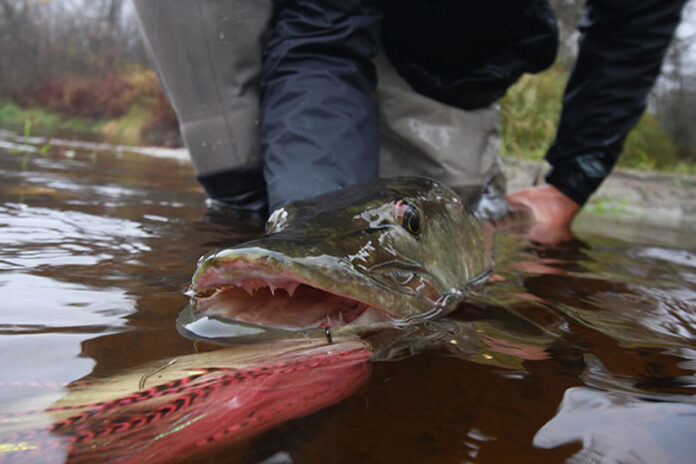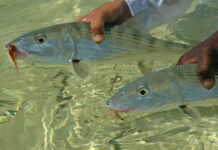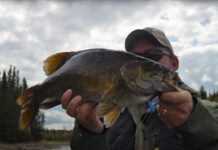Written by: Kip Vieth, Wildwood Float Trips
Photo by Kip Vieth
Do you really want to fall into the downward spiral of a musky addiction? Many of my smallmouth clients ask me about musky fishing every year, and that is the response I usually give them. Muskies are a unique and interesting species. Their draw is something I will never really figure out. They are probably one of the most frustrating fish that swims in freshwater. With the frustration also comes the sweet reward. Watching the alpha predator crush a fly is often all that is needed to get the addiction started. You might find yourself chasing that amazing feeling for years.
There are two kinds of anglers, when it comes to muskies. Some anglers become obsessed and have to keep feeding the addiction. Their lives are filled with chasing the high of the Alpha eat. They spend countless hours trying to rediscover the euphoria that only the musky can provide. The musky angler can experience the highest of highs, and the lowest of the angling lows. Then there is the angler who, after chasing them a few times, wants nothing to do with muskies. They have experienced the agony and know that their life is better off without this mistress in it. She will bring nothing but hours of heartache and remorse for that few moments of pure exhilaration. These are probably the anglers that I respect most. They know their limits and choose to walk away from a situation that will often lead to a downward spiral which few in the angling world can escape.
How do people fall prey to this downward cycle? It often starts off as a beautiful summer day, floating down one of the Upper Midwest’s five-star smallmouth rivers. It’s often innocent enough. A few popper eats, a crushing baitfish eat, and perhaps even a musky blowing up on your sSmallmouth presentation. Maybe you’re trying to land one of those scrappy smallies when, out of nowhere, a musky drills that poor unsuspecting smallmouth. Trying to replay what just happened is often the first taste. You start asking all the wrong questions, like “Wouldn’t it be something to see that fish eat one of my flies?” You have been watching smallmouths eat flies with such vengeance for a while now. This will often lead the angler to wanting the next big thing. The next big thing is the musky. The two fish have many similarities and by learning the ways of the Smallmouth, the angler can start seeing into the world of the musky. In our world the only fish that eats a fly with more tenacity and aggression is the musky!
Hunt the Hunter
The Smallmouth is possibly the most aggressive fish that swims in freshwater, so it’s probably a good thing they don’t get as big as muskies. A fish that big and that aggressive would be daunting, to say the least. When an angler fishes for smallmouths, it opens up the whole world of aggressive fish behavior. Smallmouths expose the angler to what triggers a strike and how to manipulate a fly to trigger that strike. A smallmouth angler gets to know his query very well.

Photo by Kip Vieth
Here in the Upper Midwest, especially the Upper Mississippi River, we are blessed with clear water. This can sometimes make the fish a bit spooky, but the benefits outweigh the disadvantages. By seeing how the fish react to different presentations, weather patterns, fishing pressure and seasonal differences, the angler can really start to form some great knowledge on how they will react. The angler now becomes the hunter. Deer hunters have finally started doing what we have been doing on the river for years. The use of trail cameras and other high tech equipment to observe animal behaviors around the clock has really helped to improve the odds of the hunt. We have been watching fish behavior for years, and by spending as much time as you can with that species only helps improve your knowledge and success.
Casting the Big Sticks
One of the biggest intimidation factors for a future musky angler is casting those large flies with large fly rods. Here in the north woods we cast 8-weights for smallmouths. The fish are big and fight hard, so fishing anything much smaller would not be fair to the fish. I like to see the fish swim away unharmed and healthy. ( /fly-fishing/pro-tip-choosing-the-right-fly-rod-for-your-quarry-is-vital-to-the-health-of-the-fishery/ ) We also cast pretty big flies and to make sure you don’t run out of gas, the bigger rods really help. A heavier fly rod makes for a less fatiguing day. The casting stroke is simple: pick the fly up, load the rod, and shoot it back to the target.
Many of my newer clients are old trout anglers looking for a new adventure or to extend their season. For the most part they have little experience with larger fly rods. Some might have done some limited saltwater fishing, but for the most part they have very few hours of casting experience with the larger fly rods. This all changes once they start chasing smallmouths. The average day on the water is 10 hours long. Practice makes perfect, and ten hours on the water is a lot of practice. Now multiply that by several times a year over several years, and you can get pretty proficient casting these larger fly rods. Casting the bigger musky flies is not as daunting as it would have been without a constant diet of smallmouth. This experience also translates well into the salt, if that is another addiction you’re willing to chase.
Tomorrow: Part II, Strategies
Kip Vieth owns Wildwood Float Trips, in Monticello, Minnesota. Check out his excellent “10 Tips for Catching a Musky on a Fly.”
Credit: Source link































